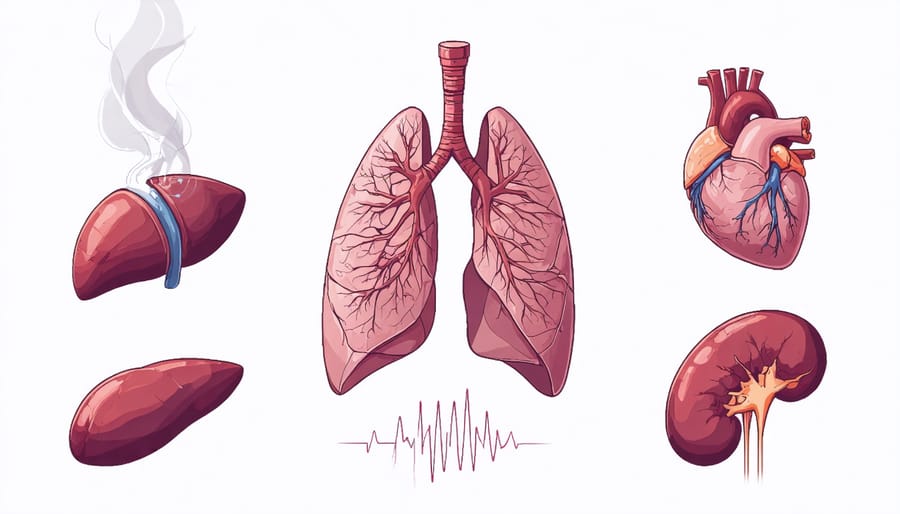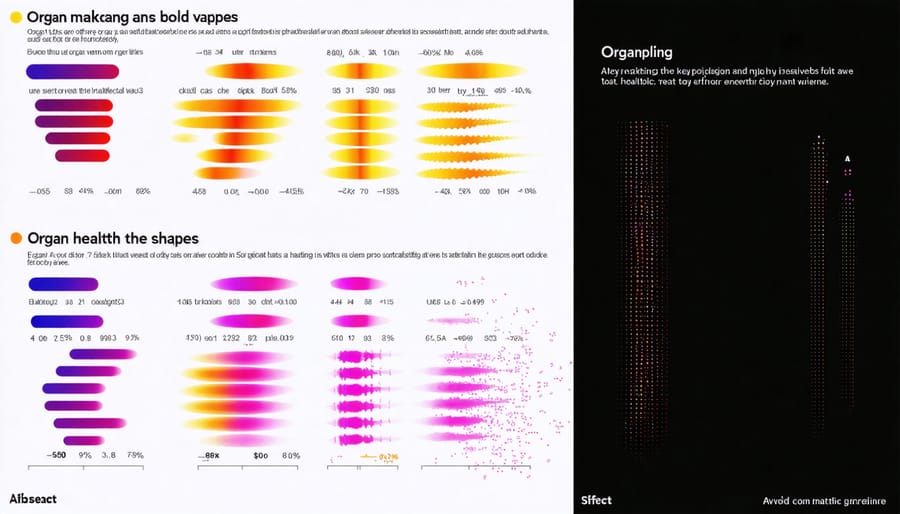The Rise of Vaping: A Quick Overview
Understanding Vaping Devices
Vaping devices come in various shapes and sizes, each designed to deliver nicotine or other substances via inhaled vapor rather than smoke. Common types include cig-a-likes, vape pens, and advanced personal vaporizers, like mods. Cig-a-likes resemble traditional cigarettes, offering a simple setup ideal for beginners. Vape pens are more sophisticated, featuring a rechargeable battery and refillable e-liquid cartridges, known for their portability and ease of use. Advanced vaporizers or mods provide customizable options, allowing users to modify power levels and flavors.
These devices function by heating a liquid, called e-liquid or vape juice, which usually contains nicotine, flavorings, and base liquids like propylene glycol or vegetable glycerin. The heating element, or coil, turns the liquid into an aerosol, inhaled by the user. Understanding these devices is crucial for evaluating their health impacts, as the components and heat levels can influence the types of chemicals users are exposed to, affecting organ health and potentially impacting one’s suitability for donation or transplantation.

Key Organs at Risk from Vaping

The Lungs: More Than Just Smoke
Vaping, often seen as a safer alternative to smoking, still poses significant risks to lung health, resembling certain dangers seen with traditional tobacco use. While both habits introduce potentially harmful substances into the lungs, vaping involves inhaling aerosols filled with nicotine and various chemicals that can damage delicate lung tissue. Emerging studies suggest that these substances might contribute to lung irritation, inflammation, and a higher risk of respiratory conditions.
Unlike cigarette smoke, the vapor from e-cigarettes tends to include flavorings and chemicals like diacetyl, which has been linked to severe respiratory conditions such as “popcorn lung.” This condition has gained attention for its possible link to vaping and continues to be a concern for healthcare professionals. Additionally, the long-term effects of vaping are not yet fully understood, leaving an air of uncertainty and caution within the medical community.
For those involved in organ and tissue donation, understanding these impacts is crucial. Those who vape or smoke might face challenges when being considered for organ donation, as their lung health could affect their suitability as donors. By gaining awareness, affected families and individuals can make informed decisions about their health and the potential implications for organ donation. In this evolving conversation, community education and proactive health choices serve as valuable tools in promoting well-being and supporting organ donation missions.
Heart Health: Hidden Dangers
Vaping, often perceived as a safer alternative to smoking, harbors hidden dangers for heart health with significant implications for organ donation. E-liquids contain nicotine and chemicals that may constrict blood vessels, elevate heart rate, and increase blood pressure, collectively burdening the cardiovascular system. For potential organ recipients, these effects can complicate transplant procedures or affect post-transplant recovery. Similarly, donors who vape might unwittingly compromise the viability of their organs due to diminished cardiovascular function.
Consider the story of Liam, a young father from Toronto. Once an avid vaper and ultimately a heart transplant recipient, he now shares his journey to underscore the risks vaping posed to his donation eligibility. Statistics reveal that cardiovascular complications from vaping are becoming more prevalent, a pressing concern for healthcare providers and families. Understanding these dangers underscores the importance of heart health awareness, fostering a community where informed choices benefit future generations of donors and recipients alike.
Impact on Liver and Kidneys
Emerging research highlights the need to assess vaping’s impact on liver and kidney health, especially given their roles in vital processes and transplantation. Vaping involves inhaling aerosolized nicotine and other substances, which the liver and kidneys must filter and process. There is growing concern that this may increase the risk of liver conditions like steatosis, which is often linked to lifestyle factors. Exploring options such as healthy weight loss may alleviate some factors affecting liver health. Meanwhile, the kidneys, responsible for toxin removal and regulation of blood pressure, can also suffer harm as chemicals from vaping may affect their filtering ability, potentially leading to chronic issues. For those involved in organ donation and transplantation communities, this is an urgent call to spread awareness and encourage healthier choices. Together, informed action can mitigate these impacts, offering a beacon of hope for healthier organ function and successful transplants.
Current Research and Findings
Key Studies
Recent research into vaping’s impact on organ health has illuminated several key findings that guide our understanding and inform healthcare practices. A pivotal study conducted by Johns Hopkins University highlighted vaping’s adverse effects on lung health, showcasing how the inhalation of e-cigarette vapor can lead to inflammation and tissue damage, potentially complicating lung transplant suitability for both donors and recipients.
Further insights come from a comprehensive study by the University of Rochester Medical Center, which explored vaping’s impact on cardiovascular health. The research revealed that the chemicals in e-cigarette aerosols could diminish heart function, stressing the importance of considering vaping habits in heart transplant evaluations.
In parallel, the University of California, San Francisco, conducted a study emphasizing vaping’s potential effects on kidney health. Their findings suggested that nicotine and other substances in vaping devices might accelerate kidney damage, an essential consideration for those involved in kidney transplantation.
Overall, these studies collectively underscore the need for ongoing research and awareness regarding the full implications of vaping on organ health and are crucial for individuals connected to the organ donation community. This evolving understanding not only aids healthcare professionals in making informed decisions but also provides hope for better health strategies and advocacy, ultimately fostering a collaborative effort towards improved organ health and successful transplants.
Understanding the Data
Recent studies illuminate the concerning impact of vaping on organ health, highlighting risks that are crucial for potential organ donors and recipients to understand. According to research, vaping can lead to detrimental changes in vital organs, including the lungs, heart, and kidneys. For example, e-cigarette users are shown to have a 34% higher risk of lung damage, which poses significant challenges in organ donation and transplant situations where optimal lung health is critical. Similarly, vaping has been associated with increased heart problems; statistics suggest a 56% increase in heart attack risk among regular users, further complicating transplant procedures.
An alarming connection also exists between vaping and kidney health. Emerging data indicate potential renal damage due to harmful chemicals in vape liquids. This poses specific concerns for those relying on kidney donations, as even minor damage can significantly affect transplant success rates. Understanding these statistics is essential for the healthcare community and families involved in organ and tissue donation. By sharing these insights, we aim to foster informed decisions and community discussions, working towards safer health practices and improved organ donation outcomes. Here, personal stories of donors and recipients underscore the importance of maintaining organ health for successful transplants and community well-being.

Personal Stories: Real-Life Implications
Emma was an energetic high school student who enjoyed spending time with friends and was drawn to the novelty of vaping. It seemed harmless at first — a trendy alternative to smoking that everyone was trying. However, after just a year of regular vaping, Emma began experiencing severe respiratory issues. Frequent hospital visits revealed the extent of damage to her lungs, which eventually affected her heart. In a heart-wrenching twist, Emma now finds herself on the organ transplant list, hoping for a second chance at life.
Her story is not unique. Young individuals like Emma are increasingly finding themselves in critical situations due to the health impacts of vaping. For some, like Alex, the consequences have been life-altering. After months of struggling with unexplained fatigue and kidney issues, Alex was diagnosed with vaping-induced kidney failure. His journey involves daily dialysis treatment while he waits for a kidney transplant that could restore his future hopes and dreams.
Similar trials can be seen in the story of Nathan, where the battle with vaping-related health challenges led him onto the path of organ donation. Nathan’s experience sheds light on the serious and often unseen repercussions of vaping.
These personal stories highlight the real-life implications of vaping on organ health, emphasizing the need for awareness and education. Families and healthcare professionals are working tirelessly to support those affected, fostering a sense of community collaboration and hope. Through sharing these narratives, we aim to offer insight, encourage preventive measures, and inspire potential donors to contribute positively to the lives of those waiting for the vital gift of life.
Community and Philanthropy: Taking Action
Awareness and Support Initiatives
In recent years, awareness and support initiatives have aimed to shed light on the profound effects of vaping on organ health. Health organizations are conducting campaigns to educate the public, especially focusing on young adults and families. These efforts include workshops, community events, and collaborations with healthcare providers to highlight studies linking vaping to organ damage. Sharing powerful personal stories, these initiatives connect individuals who have experienced firsthand the challenges of organ failure due to vaping. Additionally, the campaigns emphasize the importance of Organ Donation Awareness, encouraging more people to become informed donors and helping to save lives.
Philanthropic Involvement
Philanthropic efforts are playing a crucial role in advancing research on vaping’s impact on organ health, providing support for those affected by its consequences. Dedicated organizations are channeling funds to study the long-term effects of vaping on organs, especially in the context of organ donation and transplantation. These initiatives are helping to fill knowledge gaps and develop effective intervention strategies. Additionally, stories of donors and recipients serve as powerful testimonials, emphasizing the importance of community support. Through fundraising events, grants, and awareness campaigns, these philanthropic contributions are fostering hope and facilitating a collective effort to understand and mitigate the health risks associated with vaping.
Conclusion
As we conclude our exploration of the impact of vaping on organ health, it is essential to reflect on the key insights gathered. Vaping, often perceived as a safer alternative to smoking, has shown potential repercussions on vital organs, influencing both their health and function. Particularly concerning are the risks posed to the lungs, heart, and liver, among others—organs that are often the focus in the realm of transplantation. Emerging research highlights correlations between vaping and various health challenges, complicating the path for individuals considering organ donation or those awaiting transplantation.
Despite these challenges, there is a profound opportunity for collective action. Individuals and families can significantly benefit from staying informed about the latest research and understanding the implications of vaping. Healthcare professionals play a critical role in educating patients and advocating for healthier lifestyle choices, thus effectively supporting overall community health. Furthermore, potential donors are encouraged to engage in open dialogues about organ health and lifestyle choices with their healthcare providers.
Inspiration can be drawn from personal stories of those who have successfully navigated the complex journey of organ donation and transplantation. These narratives underscore the resilience and hope that bind communities together in the pursuit of saving lives. As a society, it becomes imperative to foster environments where informed choices are celebrated, ultimately enhancing the quality of life for potential donors and recipients alike.
By embracing a culture of awareness and compassion, we can collectively mitigate the adverse impacts of vaping on organ health and champion the cause of organ and tissue donation, fostering stronger, healthier communities for the future.
